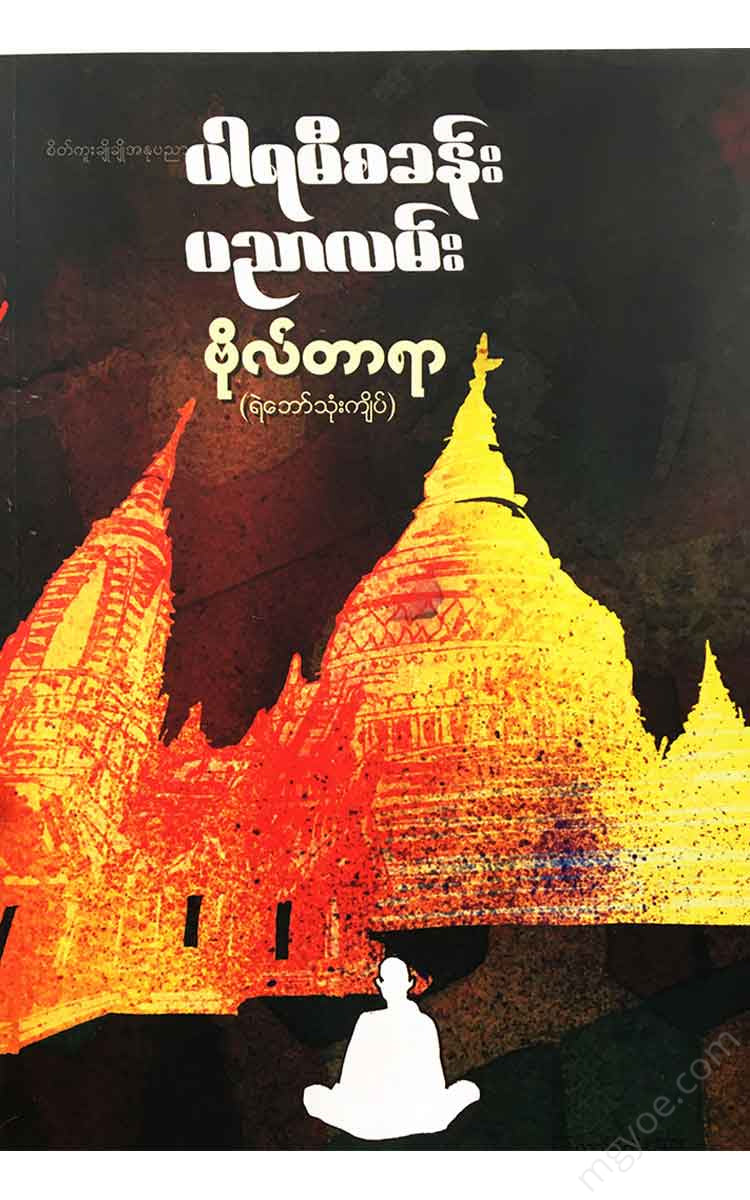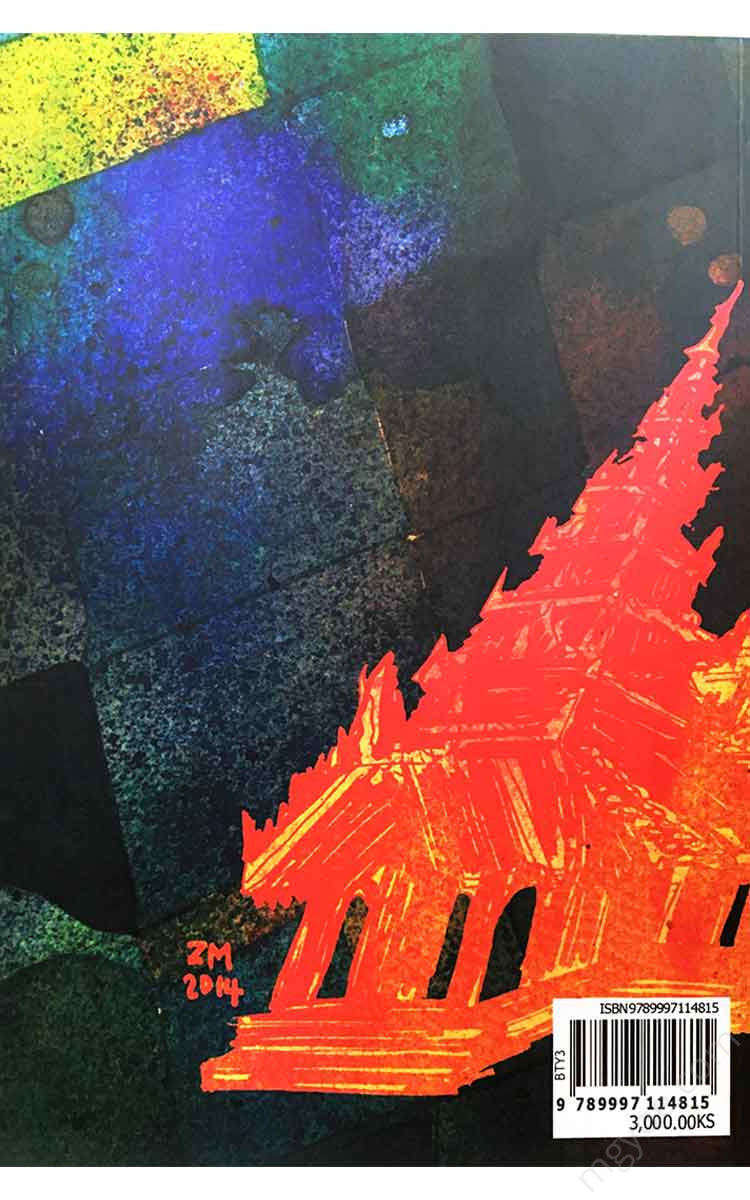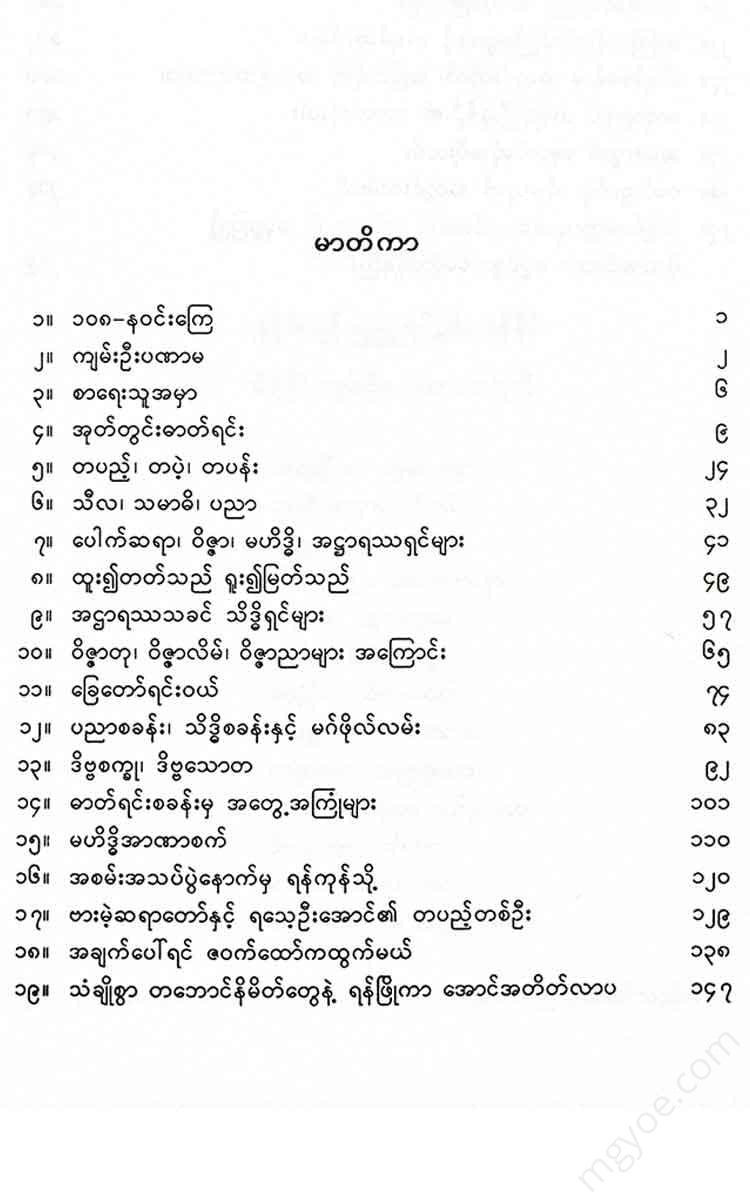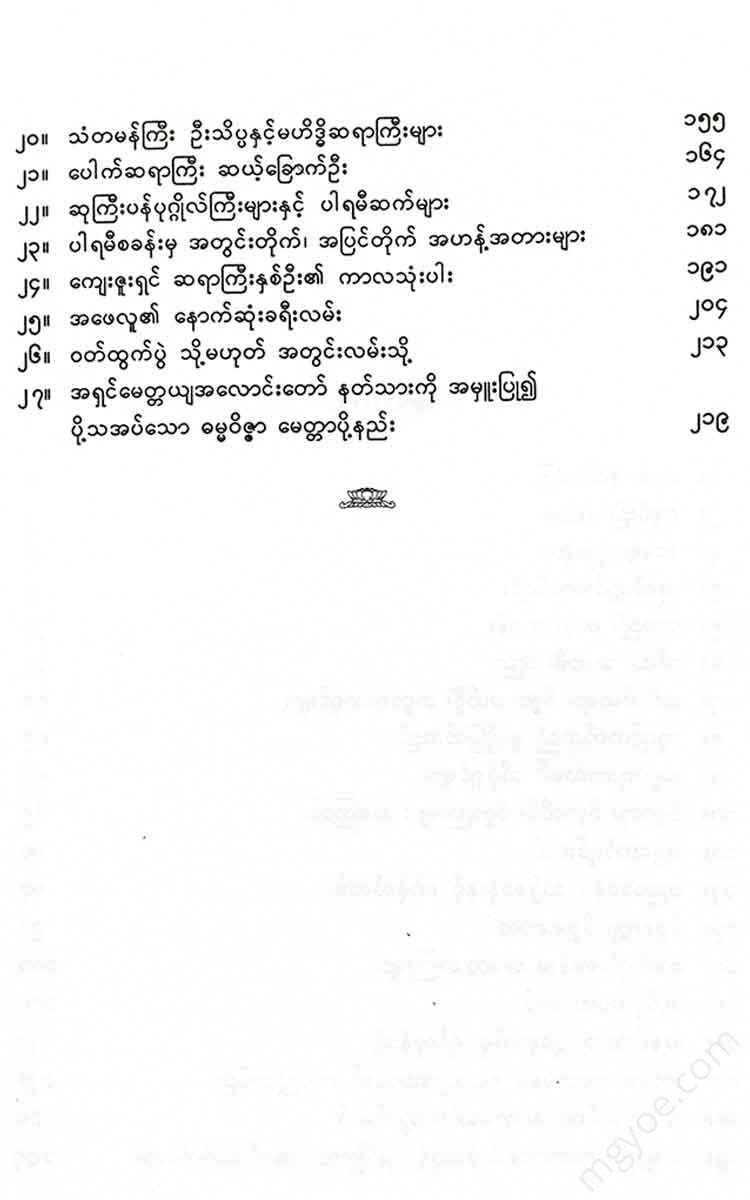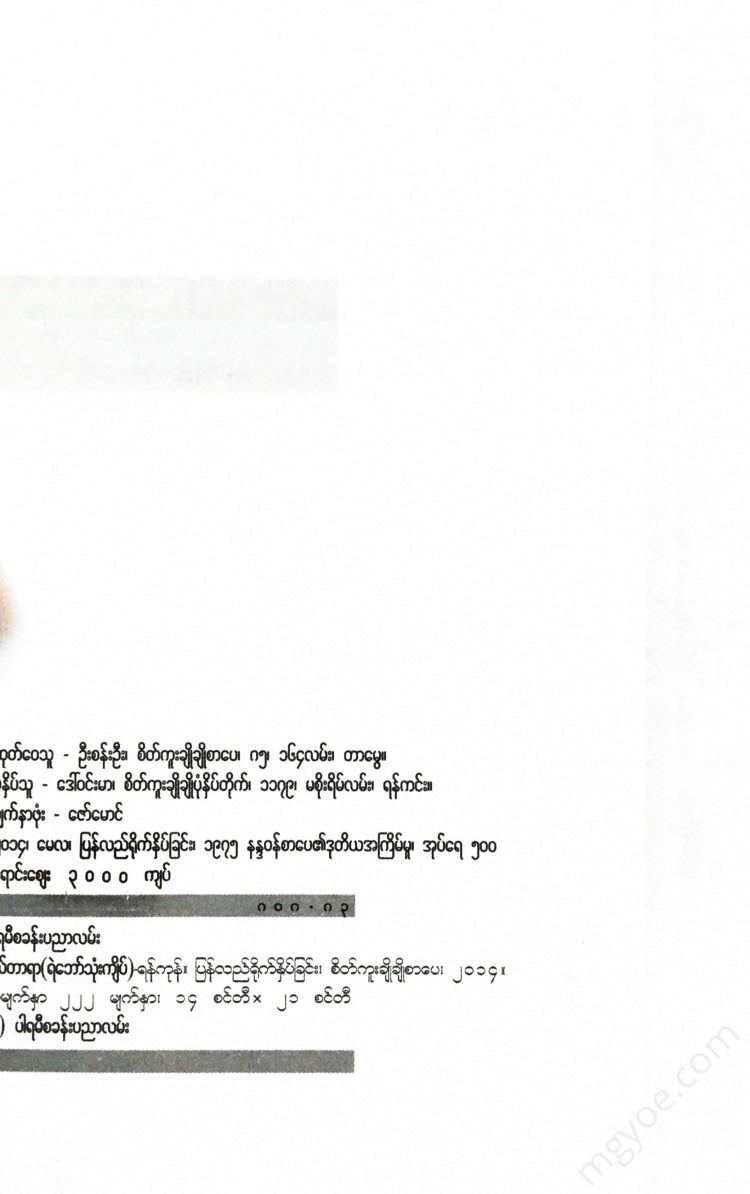စိတ်ကူးချိုချိုစာပေ
Bo Tara (Comrade Three Chiap) - Parami Camp Science Road
Bo Tara (Comrade Three Chiap) - Parami Camp Science Road
Couldn't load pickup availability
Brick kiln
It was a pleasant day, the beginning of winter, with the cold weather disappearing.
Every time a gentle breeze blows, the clear, calm water in the Mingalarkan pond, located in the Sunday corner of Moe Kaung Pagoda in Oktwin, moves and sways the lotus flowers.
I saw Father Noe sitting cross-legged near the north window of the Sudhammazarya, drinking strong tea.
He is in his fifties, wearing a large Burmese robe, a collarless white long-sleeved shirt, and an old long-sleeved white cotton shirt with yellow dots. He is teaching our children with a strong and determined face.
Suddenly, if you look at this fair-skinned Burmese handsome man, you will be filled with respect. However, if you listen to the teacher's words and teachings and criticize him for a day, even those critics will come to love and respect him with a desire to never leave the teacher's feet. Therefore, the audience of Dhammawisdha grew day by day, and they also met the Six Buddhas.
Father Nwe was known at that time as the Thirty-One World Master and the Bricklayer Master.
The words "Salinri" and "Saya" are written in different ways, and their meanings are also very different. The word "Saya" means a person who is endowed with the shadow of "Saya" and is endowed with virtue, integrity, knowledge, and honor, who is free from the heat of the sun, whose shadow is like a big umbrella, and who can give coolness and peace. Father Nwe himself explained and taught that "Saya" refers to a person who is endowed with the shadow of "Saya".
If the second person, “teacher,” were asked which paragraph to include, such as teachers who teach students, then the spirit, morality, integrity, knowledge, and performance of those persons should be determined and the two paragraphs “ teacher ” and “ teacher ” should be called and noted down. I have been admiring Father Noe’s face from the top of his head to his shoulders, waist, and feet without blinking. My desire is to practice remembering the Buddha image and the images as the signs of the rosary when I focus on them. Then I am also practicing remembering the face of my benefactor Father Noe at all times.
From a distance, I realized that Father Nwe, with his calm and mature face, was teaching me calmly and clearly, as if he were a wise and wise person who knew my innermost thoughts and desires.
“My disciples and children, never forget the Three Jewels. Believe in the Buddha, believe in the Dhamma, and have no doubts about the true monks. You must also respect and bow to your parents and teachers.”
The teacher continued to give advice. "Especially, don't make mistakes in your teaching. Starting with me, all my students and children should examine, criticize, and test before they follow, listen to, and fight. If you make mistakes in your teaching, your life will end. Remember that you will not be released throughout the cycle. Don't look too much at the Ajata, if you feel the wealth of the king himself, your life will not be so bad. Even the good-looking Devadatta has not been released from hell until now because of the mistakes in your teaching." He instructed.
I must confess that I have studied and investigated the scientific methods that are popular today since I first met Father Noe. I have investigated them countless times and at my own discretion. Father Noe not only knew every idea that I had in mind beforehand, every minute of it, but also spoke to me with a smiling face about the ideas that I would have in the present time, along with the results and the numbers that I would encounter. As the teacher had predicted, the present events have inevitably coincided with what I had experienced.
Once, while I was with my father, in the middle of a hot summer afternoon, the teacher, as if ignoring our hot troubles, looked deeply at the fish in the Mingalarkan, whose water had dried up and were struggling to swim...
“Isn’t it bad if it rains, Aung Tin?”
We asked Aung Tin about Father Nwe's son, who was talking in the crowd. Aung Tin, who knew Father Nwe's moral integrity well, said, "That's right, Master, the creatures are suffering greatly." The Master turned to me and said...
“Hey, child, put as many buckets and water pots as you like under the eaves to make it easier for you to carry water.” He ordered, but there was not a single hint of rain, and he did not dare to deny the teacher’s words, who had said that it would rain heavily in the middle of summer, so he took small steps and stood up...
"What? Do you doubt that it will rain in the middle of summer? If you have the power of the world, you can do anything. Just do what you have to do. If you want to take a shower, have a towel and a soap dish ready."
Because of further urging, I quickly lined up the buckets and water pots and grabbed the ashtray and face towel.
Father Noe himself wrapped himself in a towel and a wet cloth, grabbed a soap dish, and went outside the Dhamma Temple, looking up at the hot sky.
Within seconds, the sound of wind and rain came together and rain fell in torrents. The raindrops were not small and scattered. They were like heavy raindrops that poured down in torrents, pouring down all nine directions at once.
My father stood on the ledge, showering in the rain, soaking me in the soap, and warning me, “My son, why are you looking at me?” I immediately stopped my fruitless investigation and took a shower near my father.
“When you are in need, you must save beings, my son. Remember that the mission of the Nyudhama Vijja Parami Camp is to save beings.”
After giving the warning, he took a shower and refreshed himself, wrapped his face in a towel, and stood on the steps of the Sudhammazarayat, sheltered from the rain.
After more than half an hour of heavy rain, when the buckets and water pots filled up to the brim, Father Nwe said, “Enough, let’s stop the rain.” He took off the towel he was wearing, stepped out into the rain, and shook it three times. Suddenly, the rain stopped.
I nodded urgently and looked up at the sky. There was not a single drop of rain in the sky, it was clear and the weather was starting to turn cold.
The disciples from the Oktwinme hill came running towards the father and started to cheer. They all knew the father's virtue and integrity very well, and now, not at that time, they had learned the reason for the rain, so they rushed to the father's mercy and thanked him.
"Hey.. hold on to your own Dharma, only if you can practice it will you be able to do it," U Kyaw Yin said.
"I'm glad, Master. It's still unbearable hot, so you've asked for rain," he said urgently.
“Remember, heat is impermanent, cold is impermanent, poverty is impermanent, and wealth is impermanent. All of this is just mental formations,” he explained again.
"We, the Dhamma-wisdom, must always uphold the Dhamma, observe the precepts, and put love first. Only when we have human ethics, good morals, will there be Dhamma in the world. Even if the sky is not covered by rain, the crows' feathers will be wet and the ground will be wet," he began to preach.
I changed my clothes and poured a bowl of black tea and handed it to the teacher.
“Father, what does Dhamma knowledge mean? Please explain it to me,” he pleaded.
“Well, Dhamma-wijja is the title given to those who practice and develop the power of the worldly Dhamma. Dhamma-wijja is the noble Dhamma. The Buddha himself and the arahants are the greatest persons of Dhamma-wijja. Any person who practices the noble Dhamma in the noble abode is a Dhamma-wijja.”
As I was telling him, I asked, for the sake of knowledge, “When did the Dhamma and Arts profession emerge in Myanmar?”
“It’s a good question, I knew that in the future, my son would be responsible for leading the Dharma practice and explaining it.”
“Remember, all my audience, the Dhamma-wizza work was carried out by the great monk Mahinnarahanta, the son of the great king of Ceylon, who came from Ceylon to preach during the reign of King Manuha of Hothaton, and established a camp and built a monastery,” he began.
“The path of Dhamma is also called the work of the Paramīs. The people who work in that Dhamma are usually the great sages. The great sages, the little sages of the Pacceka Buddha, the sages of the Buddha who gives the sutras, the great sages, the great sages, the great sages. The Dhamma is the center where the great sages gather, and the humblest person is the sage of the natural sages.
"Throughout this life, we have fulfilled the ten great merits that we have asked for, and we have fulfilled the thirty great virtues. We have been striving for the worldly virtues while enduring the sins we have committed throughout the endless cycle of life. The bodies of these great virtues, who will soon be born, are adorned with flowers from the Buddha's body, which will travel a long way before the Buddha, who will soon be born. The devotees of the Buddha, who will listen to the Dhamma in front of the Buddha, have realized the Four Noble Truths. The great monks and nuns, each of whom has attained enlightenment according to their own prayers," he said patiently, teaching and teaching.
Father Nwe remembered something, “You and I have gone through many cycles of life. We have reached the final stage in the human and divine realms. In Burma, from the time of King Tagaung Abiraja to the end of the Konbaung era, we have also danced on the stage of the thirty-one realms in the historical records and in the parts that are not mentioned. We have accumulated and enriched our paramis by going through cycles according to the principle of samkara. We have lived various lives as Burmese, Mon, and Shan. The main goal is to try to reach the lowest life in these lives.”
After speaking.
“Human life is a difficult and difficult thing. It is given to us in abundance. Just as it is difficult to be human, it is also difficult to be immersed in the Dhamma. It is difficult to be immersed in the Dhamma and still be able to practice Dhamma. Even after practicing Dhamma, we need to be persistent and constantly exert ourselves. It is difficult.
"In the future, it will be very difficult to become a mortal. The human world is very noble. Isn't the Buddha, who is unparalleled in the thirty-one realms and full of infinite grace, from the heavenly realm? After the human world is over, he will become a human."
